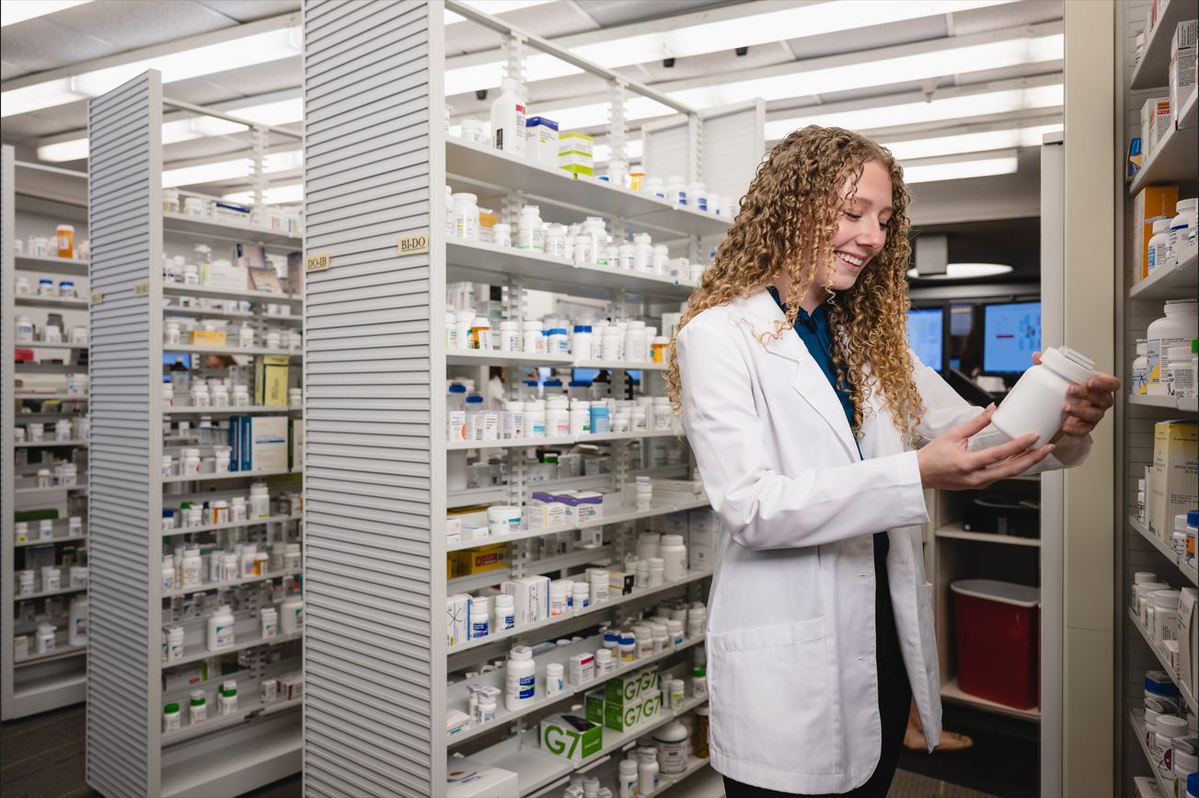
Purdue’s Pharmacy Tech Training Course Gives Students Training in a Vital, Growing Industry
In the United States, the number of Americans who have chronic health conditions, such as heart disease and diabetes, has gone up. This is in part because the United States’ population is skewing older – studies estimate that there will be over 220 million people 50 years old or older living in the United States by 2050, and of that population, about 142 million will have at least one chronic illness. The COVID-19 pandemic has also increased rates of chronic illness, creating what some experts call a crisis.
Modern medicine has created numerous defenses against chronic health conditions, and many people with chronic health conditions use prescription medication to manage their symptoms and improve their health outcomes. According to Centers for Disease Control and Prevention data from 2018, nearly half of the U.S. population takes at least one prescription medication on a regular basis. This statistic has likely gone up since 2020, with some polls estimating that 70% of Americans now take at least one prescription medication regularly. Further, global healthcare spending is increasing steadily, driven by factors such as advanced medical treatments and greater awareness of health and wellness.
Considering the increased public awareness about the importance of investing in healthcare and the large number of Americans who take prescriptions daily, the pharmacy industry is experiencing a lot of growth. As pharmacies expand their services to help more and more people manage their medications, the demand for pharmacy technicians is expected to rise. According to the Bureau of Labor Statistics, pharmacy technician jobs will be growing by 6% over the next 10 years, faster than average for other occupations.
Purdue University’s Pharmacy Technician Training Program, offered by the Purdue College of Pharmacy, seeks to meet the demand for pharmacy technicians with a convenient and practical online education option. The program, which is open to learners who have no prior college experience, gives students the skills they need to take the national Pharmacy Technician Certification Exam and become a certified pharmacy technician.
What do Pharmacy Technicians do?
Though there are a lot of opportunities in the pharmacy technician field, many people don’t understand what pharmacy technicians do, and the impact they can have on patients’ lives. According to Pam Ringor, Purdue University College of Pharmacy academic advisor and former pharmacy manager, pharmacy technicians help patients navigate and understand their care, which can make their healthcare experience better overall.
“Technicians are critical to help pharmacists be able to give excellent patient care by optimizing patients’ medications,” said Ringor. “Without a great technician, that would be nearly impossible. Technicians themselves directly impact patient care through helping customers with insurance problems, ordering items, working with immunizations and so on.”
From a patient’s perspective, pharmacists and pharmacy technicians are often the most accessible, frequently visited healthcare providers, and they play an essential role in healthcare delivery by communicating with and educating patients about prescription medications.
“Pharmacy technicians can impact patients’ lives by developing relationships with patients,” said Katie May, Purdue University College of Pharmacy senior academic advisor and practicing pharmacy technician. “Techs are usually one of the first faces a patient sees when arriving at the pharmacy and can build strong rapport with patients. If patients have a good experience at the pharmacy, they generally continue coming back to the same pharmacy for a long time.”
Pharmacy technicians work in retail and independent pharmacies, hospitals, and other healthcare organizations, such as mail-order prescription services. The job duties they perform can vary based on where they are working, but include preparing and distributing patient medications, preparing sterile medicines, collecting patient information, providing customer service, assisting with prior authorization completion and billing claims, maintaining patient records, and ensuring compliance with regulatory requirements.
To work as a pharmacy technician, one must be knowledgeable about prescription medications and the requirements of preparing and distributing therapeutic drugs, while also being aware of changes that occur within the field. Since the science behind pharmaceuticals develops quickly, pharmacy technicians often work in fast-paced environments in which information changes frequently. This makes working as a pharmacy technician an exciting and rewarding career opportunity that usually has ample opportunities for growth.
“Technicians can work their way up to take on more advanced roles,” Ringor said. “At the pharmacy, they can be a team leader, train technicians, do scheduling, help with inventory, and so much more. Some of my past technicians have moved up in the company to take on district-wide training, compliance, scheduling and special projects such as rollouts of immunizations.”
About Purdue’s Pharmacy Technician Training Program
Purdue’s Pharmacy Technician Training Program prepares learners to take the national Pharmacy Technician Certification Exam, which is required to start working as a pharmacy technician. Immediately after successfully completing Purdue’s course and passing the national certification exam, learners can pursue a career as a pharmacy technician.
The program is a good upskilling opportunity for learners who recently graduated high school and are entering the workforce, and older learners who are considering a career change. The curriculum covers pertinent information on drugs and medications, federal laws and requirements, prescription order entry and processing, patient safety, and quality assurance.
The training is fully online and students can choose between a 16-week program and an 8-week program, depending on their schedules. To register for the 16-week program, visit this webpage. To register for the 8-week program, visit this webpage.